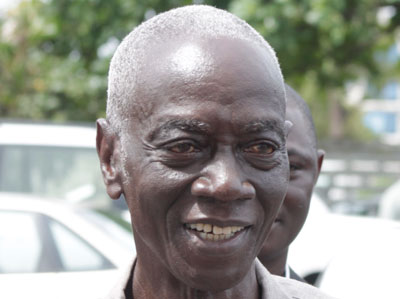Ghana’s elections transparency very, very high – Afari-Gyan
 The Chairman of the Electoral Commission, Dr. Kwadwo Afari-Gyan has told the Supreme Court hearing the petition against the outcome of the 2012 presidential election that the level of transparency in Ghana’s elections is very, very high.
The Chairman of the Electoral Commission, Dr. Kwadwo Afari-Gyan has told the Supreme Court hearing the petition against the outcome of the 2012 presidential election that the level of transparency in Ghana’s elections is very, very high.
Advertisement
He said the processes are so verifiable that one is able to ascertain whatever goes on at any polling station.
Dr. Afari-Gyan made the assertions under cross-examination by lead counsel for the petitioners, Mr. Philip Addison, who had suggested to the witness that he was part of an independent international electoral team which recommended certain actions to engender credible national elections in Nigeria in 2011 but he had acted contrary to those recommendations in the case of the 2012 elections in Ghana.
The recommendations, according to Addison, included the need to hand parties in the election, results collation sheets and other steps to be taken to ensure greater transparency in the Nigerian elections.
“One of the recommendations was that given the severe lack of confidence in the INEC (Independent National Electoral Commission) leadership … and INEC’s perceived partiality in favour of the incumbent, the president, executive should reconstitute the INEC chair and board based on a broad and inclusive consultation process. Do you remember this?” Addison asked Afari-Gyan.
Afari-Gyan: Very, very well.
Philip Addison: Now Dr. Afari-Gyan, if given the same opportunity in Ghana would you make such a recommendation?
Afari-Gyan: My Lords we have a very, very good, transparent, firm and tested system.
Philip Addison: You mean this recommendation is fit for Nigeria but not for Ghana?
Afari-Gyan: My Lords there are many countries that would like to emulate the Ghanaian electoral system.
Philip Addison: The second recommendation was “INEC should be transparent in its work by providing full information to election stakeholders in easily accessible formats’, would you recommend that to Ghana?
Afari-Gyan: My Lords we have always done that in Ghana. We have always done that in Ghana. We’ve even gone beyond that… in many places they wouldn’t even know where they are printing the ballots, the calculations on which the ballot printing is based, you are not allowed to be present when voters are being registered – all these things have become part and parcel of our electoral system. The level of transparency is very, very high and as a result the level of verifiability. In fact we are here, we are able to verify what happened in Bunkpurugu Yunyoo (Northern Region), what happened in Anyimon (Brong Ahafo) my hometown, what happened in Bubiashie (Greater Accra) and so on, that is the level of transparency.
Philip Addison: Another recommendation was that a major area of concern has been the lack of transparency and verifiability in the results process. The counting of votes and the transmission and tabulation of results must be transparent and conducted in strict compliance with the electoral law. In particular, results of each polling station should be announced and preferably displayed at the polling station as well as at all the other points of collation. Copies of polling station results should be given to party agents and all other persons entitled by law to receive them. For purposes of greater transparency, a copy of the results at each counting or collation point could be made available to domestic observers present. All total results announced should be accompanied with a breakdown of the composite unit. The more easily available the individual polling unit results are at higher levels of collation, the more easily parties and other stakeholders can check the veracity of the results thereby improving confidence in the process and acceptance of the electoral outcome. Beautiful words. Will you recommend that for Ghana?
Afari-Gyan: In effect what we were doing was recommending the Ghanaian system to Nigeria. (His response sent the courtroom into a rapturous laughter.)
Philip Addison: I think you have just forgotten that you denied the petitioners access to collation sheets, the very thing you are talking about here, you’ve denied it to the parties, you’ve forgotten about that.
Afari-Gyan: I have not denied you access to any information.
Philip Addison: Do parties in Ghana have access to collation sheets that you are recommending Nigeria to have? Do people in Ghana have it?
Afari-Gyan: My Lords the recommendation doesn’t say that they should be given the collation sheet.
Philip Addison: I didn’t get your answer.
Afari-Gyan: Look the collation sheet is such a big thing that you don’t give it to everybody that is why after the collation there is a summary sheet that we give to everybody.
Philip Addison: Dr. Afari-Gyan, Nigeria, so many times bigger than Ghana and obviously with far bigger constituencies you are recommending that the collation sheet should be given to parties and you are saying that in Ghana it’s too big a sheet to be given out, is that what you are telling this court?
Afari-Gyan: My Lords, I did not recommend that the collation sheet be given to the parties. I said the collation results be given to the parties.
Addison concludes his cross-examination of Dr. Afari-Gyan on Tuesday. Addison on Monday led evidence on alleged double registration in the voters register as handed the New Patriotic Party for the 2012 election.
The petitioners, Nana Addo Dankwa Akufo-Addo, New Patriotic Party (NPP) presidential candidate in the 2012 elections; his running mate Dr. Mahamudu Bawumia and NPP national chairman Jake Obetsebi Lamptey want the court to overturn the results in favour of Nana Addo instead of President John Mahama who was declared winner by the Electoral Commission.
Story by Isaac Yeboah/Graphic.com.gh
Ghana